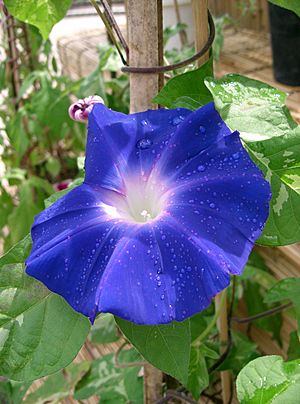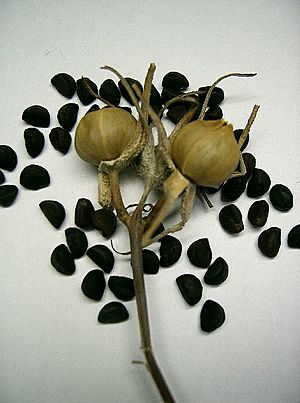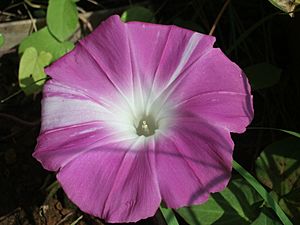Japanese morning glory facts for kids
Quick facts for kids Ipomoea nil |
|
|---|---|
 |
|
| Scientific classification | |
| Kingdom: | |
| (unranked): | |
| (unranked): | |
| (unranked): | |
| Order: | |
| Family: | |
| Genus: | |
| Species: |
I. nil
|
| Binomial name | |
| Ipomoea nil (L.) Roth
|
|
Ipomoea nil is a beautiful type of morning glory flower. People call it by many names, like white-edge morning glory or Japanese morning glory. This plant originally comes from warm, tropical parts of the world. But now, you can find it in many places because people have planted it. It is a popular ornamental plant, meaning it's grown for its pretty looks. Sometimes, seeds escape from gardens and grow wild.
This plant is a climbing annual herb. This means it grows new each year and uses other plants or structures to climb. Its leaves have three points and are about 3 to 8 centimeters long. The flowers are several centimeters wide. They can be blue or pink, often with white stripes, edges, or mixed colors.
Growing Ipomoea nil
Many people grow Ipomoea nil as an ornamental plant in their gardens. It's loved for its colorful flowers. This plant is an annual herb, so it completes its life cycle in one year. It grows by climbing, using its stems to wrap around supports.
The leaves of this plant are shaped like three points. They usually measure between 3 and 8 centimeters long. The flowers are quite wide, often several centimeters across. You can see them in many shades of blue, pink, or rose. Sometimes, they have cool patterns like white stripes or edges. Some popular types of this plant are called 'Scarlet O'Hara', 'Early Call', and 'Rose Silk'.
Morning Glories in Japan
Morning glories are very popular flowers in Japan. People believe they arrived in Japan a long time ago, around the 8th or 9th century. They might have come directly from China or through Korea.
During the Edo period (from the 17th to the 19th centuries), more people started living in cities. This led to a big trend of growing morning glories in pots. People loved to collect different colors and sizes of these flowers.
Today, in early summer, special morning glory markets are held in big Japanese cities. At these markets, sellers and flower lovers trade and sell these beautiful plants. The biggest market is the Iriya Morning Glory Market. It takes place around Shingenji Temple in Iriya, Taito-ku, Tokyo.
Images for kids
-
"Morning Glories in Iriya, Eastern Capital" (1866), No 28 of "The Thirty-six Selected Flower Scenes" by Hiroshige II
See also
 In Spanish: Ipomoea nil para niños
In Spanish: Ipomoea nil para niños







